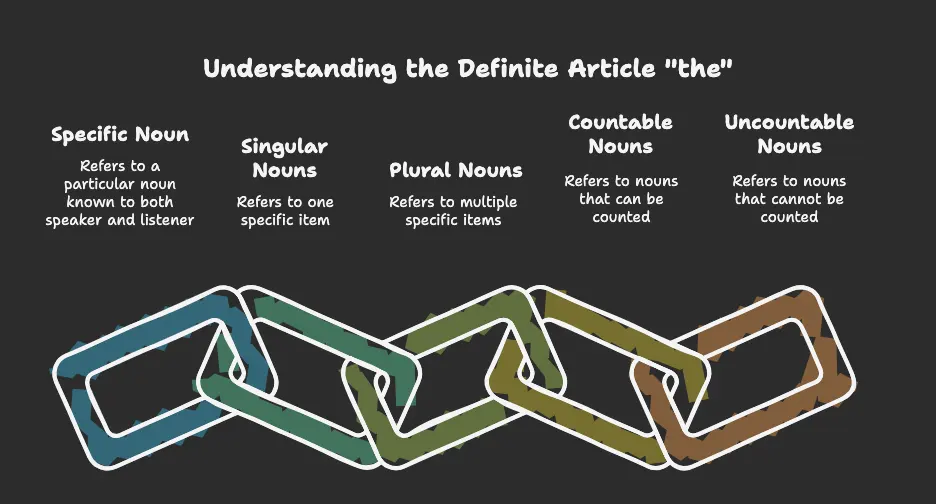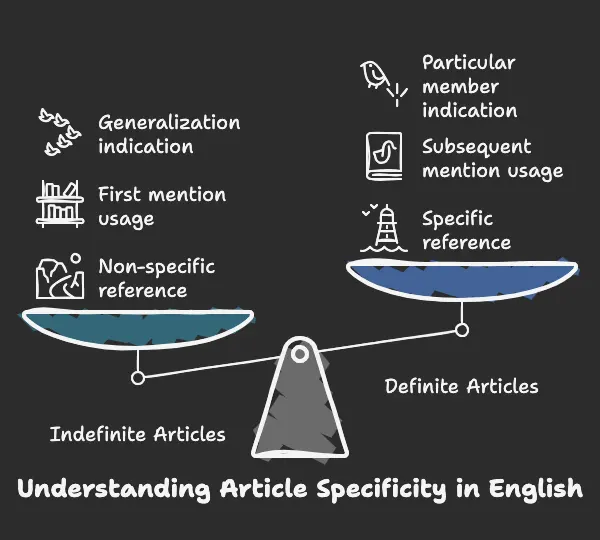Have you ever stumbled over whether to say "a apple" or "an apple"? Or felt unsure if you should use "the" before a certain noun? You're not alone! The English articles – a, an, and the – might seem like tiny words, but they play a huge role in the clarity and correctness of your English. Think of them as subtle pointers that guide your listener or reader to understand whether you're talking about something general or specific.
Mastering these significant grammatical components is essential for fluent and accurate communication. In this comprehensive guide, we'll look closely at English articles, explain their functionality, highlight their importance, and equip you with practical tips to avoid common usage mistakes.
Diving into Indefinite Articles: A and An
What are Indefinite Articles?
The indefinite articles, "a" and "an," are fundamental to non-specific or general nouns. They signal that you're talking about one of many possible items or concepts. They are very often used to introduce something for the first time or to refer to any member of a particular group.
The Rule of Sound: When to Use "A"
The golden rule for "a" is to use it before words that begin with a consonant sound. It's crucial to focus on the sound, not just the letter itself.
- Examples:
- a car (starts with the consonant sound /k/)
- a table (starts with the consonant sound /t/)
- a university (while it starts with the vowel 'u', the pronunciation begins with a consonant sound /ju:/)
- a European country (again, the initial sound is the consonant /ju:/)
Notice how it's the sound that matters. Don't get distracted by the spelling!
The Rule of Sound: When to Use "An"
Conversely, we use "an" before words that begin with a vowel sound. Just like with "a," pay close attention to how the word is pronounced.
- Examples:
- an apple (starts with the vowel sound /æ/)
- an hour (the 'h' is silent, so the initial sound is the vowel /aʊ/)
- an honest mistake (the 'h' is silent, starting with the vowel sound /ɒ/)
- an umbrella (begins with the vowel sound /ʌ/)
Again, the sound aspect is key to making the right choice.
Key Rules for Indefinite Articles:
- Singular Countable Nouns Only: Indefinite articles can only be used with nouns that are singular and can be counted.
- Correct: a book, an idea
- Incorrect: a waters, an informations
Exploring the Definite Article: The
What is the Definite Article?
The definite article, "the," is used when you're referring to a specific noun that is already known to both the speaker and the listener. It indicates "this particular one" or "the one we're both aware of."

Common Uses of "The":
- Referring to Specific Nouns: When the identity of the noun is clear from the context or has been mentioned before.
- Example: "I read a book yesterday. The book was very interesting." (We now know which book is being discussed.)
- Example: "The keys are on the table." (Both the speaker and listener likely know which keys are being referred to.)
- Unique Entities: Used for things that are one-of-a-kind in the world or a specific context.
- Example: The sun, The moon, The Earth, The internet, The President
- Generalising About Groups: "The" can be used with a singular noun to represent an entire class or group.
- Example: The lion is a majestic animal. (This refers to lions in general.)
- Example: The bicycle is a sustainable mode of transport. (This refers to bicycles as a whole.)
- Geographical Features: Typically used with the names of oceans, rivers, mountain ranges, deserts, and certain countries (often those with plural names or including words like "kingdom," "republic," or "states").
- Example: The Pacific Ocean, The Nile River, The Himalayas, The Sahara Desert, The United Kingdom, The Philippines
- Note: We generally don't use "the" with individual lakes or mountains (e.g., Lake Michigan, Mount Everest) or most single-word country names (e.g., France, Japan).
- Specific Uncountable Nouns: When referring to a particular instance or quantity of an uncountable noun.
- Example: "The water in this bottle is cold." (We're not talking about water in general, but the specific water in the bottle.)
- Example: "The knowledge she gained from the course was invaluable." (Referring to specific knowledge.)
Important Rules for "The":
- Versatile Usage: Unlike "a" and "an," "the" can be used with singular, plural, countable, and uncountable nouns.
- Avoid Generalising Uncountables/Plurals: Be careful not to use "the" when you're speaking about uncountable or plural nouns in a general sense.
- Correct: Water is essential.
- Incorrect: The water is essential.
- Correct: Dogs are loyal companions.
- Incorrect: The dogs are loyal companions.
The Absence of an Article: The Zero Article (ø)
Sometimes, the correct choice is to use no article at all! This is known as the "zero article."
Common Situations for the Zero Article:
- General Plural and Uncountable Nouns: When you're talking about these nouns in a general way, without referring to a specific instance.
- Example: Books are a source of knowledge. (Books in general)
- Example: Sugar is sweet. (Sugar in general)
- Example: Friendship is important. (Friendship as a concept)
- Proper Nouns: Generally used before the names of people, cities, countries (most single-word names), days of the week, months, and holidays.
- Example: John is a doctor.
- Example: Paris is beautiful.
- Example: I'm going to Italy next week.
- Example: We have a meeting on Monday.
- Example: January is usually cold.
- Example: We celebrate Christmas in December.
- Note: Remember the exceptions for countries like the United States or the Netherlands.
Key Differences Summarised
Let's recap the fundamental distinctions:

Practical Tips for Mastering Articles
Using English articles correctly can seem tricky at first, but with consistent practice and attention, you'll get the hang of it. Here are some practical tips to help you avoid common mistakes:
- Focus on Pronunciation, Not Just Spelling: When deciding between "a" and "an," always listen to the initial sound of the following word. Don't rely solely on whether the first letter is a vowel or a consonant. Practice saying the words aloud.
- Context is Your Best Friend for "The": Ask yourself, "Does my listener/reader know which specific noun I'm talking about?" If the answer is yes (because you've mentioned it before, it's obvious from the situation, or it's a unique entity), then "the" is likely the correct choice.
- Think General vs. Specific with Uncountable Nouns: When referring to uncountable nouns like water, information, or advice, consider whether you're talking about them in a general sense (no article) or a specific instance or quantity (use "the").
- Read Widely and Pay Attention: One of the best ways to internalise the rules of article usage is to read a variety of English texts – books, articles, news reports, etc. Notice how native English speakers use articles in different contexts.
- Listen Carefully to Native Speakers: Pay attention to how native English speakers use articles in everyday conversation. This will help you develop an intuitive understanding of their usage.
- Practice Regularly and Don't Be Afraid to Make Mistakes: Like any aspect of language learning, mastering articles takes practice. Do exercises, write in English, and don't be discouraged by errors. Mistakes are part of the learning process. Ask for feedback if you're unsure.
Conclusion: Articles – Small Words, Big Impact
While they may be small in size, English articles – 'a', 'an', and 'the' – wield significant power in shaping the meaning of your sentences. Understanding their functionality and knowing when to use them (or when to omit them) is crucial for clear, accurate, and natural-sounding English communication.
Keep practicing, pay attention to the language around you, and don't hesitate to revisit this guide whenever you need a refresher. With a little effort, you'll confidently navigate the nuances of English articles and elevate your language skills to the next level.
Frequently Asked Questions (FAQ)
Q1: How do I know whether a word starts with a consonant or a vowel sound?
A: The key is to listen to the very first sound of the word, not just look at the first letter. For example, "university" starts with the letter 'u' (a vowel), but it's pronounced with a 'y' sound (/ju:/), which is a consonant sound. Therefore, we say "a university." Similarly, "hour" starts with 'h' (a consonant), but the 'h' is silent, and the first sound is the vowel /aʊ/, so we use "an hour." If you're unsure, try saying the word aloud.
Q2: When can I use "the" with uncountable nouns?
A: While you mostly don't use "the" with uncountable nouns when speaking generally (e.g., "Water is essential."), you do use "the" when referring to a specific instance or quantity of that uncountable noun. For example, "The water in this bottle is cold" refers to a particular water. Similarly, "The information she gave me was very helpful" refers to specific information.
Q3: Are there any exceptions to the rules for using "a" and "an"?
A: While the consonant/vowel sound rule is the primary guideline, there are a few nuances. For instance, some speakers might use "a historical" instead of "an historical," especially if they pronounce the 'h' strongly. However, "an historical" is generally considered more traditional and still widely used. The focus on the initial sound remains the most reliable rule.
Q4: Why is it so important to use articles correctly in English?
A: Using articles correctly is crucial for clarity and accurate communication. Choosing the wrong article or omitting one can change the meaning of your sentence and sometimes lead to confusion. For example, saying "I saw dog" is grammatically incorrect and doesn't specify which dog you saw. Using "I saw a dog" implies any dog, while "I saw the dog" suggests a specific dog that the listener likely knows about. Correct article usage makes your English sound more natural and professional.
Q5: What's the best way to improve my article usage?
A: The best approach is a combination of understanding the rules and consistent practice. Pay close attention to how native English speakers use articles in speech and writing. Read widely and actively notice the articles used. Don't hesitate to ask for feedback on your writing and speaking. Over time, with exposure and practice, correct article usage will become more intuitive.




